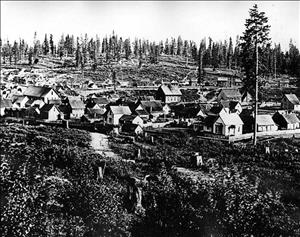On September 24, 1892, five robbers hit the Benjamin E. Snipes and Company Bank in Roslyn when the payroll for the Roslyn mine is delivered -- upwards of $100,000. Three of them demand money from the cashier and when he hesitates, pistol-whip him. They run out of the bank and exchange gunshots with some townspeople. Then they meet up with two accomplices, jump on horses and gallop into the mountains. They get away, but with far less cash than they counted on -- the payroll had not yet arrived.
The robbers were later identified as an outlaw gang comprising Matt Warner (alias Ras Lewis, alias Willard Christiansen, alias Diamond Dick), Bill McCarty, Tom McCarty, George McCarty, and Fred McCarty. They had pulled off several previous bank robberies around the West and had been partners in crime with Butch Cassidy.
Robbery and Getaway
The Roslyn job was nearly foiled when an assistant cashier, on his way to the bank, saw what was going on, ran into a hardware store, and recruited some men to confront the robbers outside the bank. When the bandits saw the men approaching, they opened fire, winging the assistant cashier and another man. The robbers fled on horseback into the hills.
A posse rode in hot pursuit, but the robbers eluded them. They rode to a cabin deep in the mountains, where they doled out shares of the money and took off in different directions. One of the robbers later claimed the total was $30,000, but trial testimony put it at only $5,000 or $6,000.
An Innocent Man Convicted
Rewards were offered, and within weeks a Spokane detective arrested three men named Cal Hale, Tom Kimzie, and George Zachary in eastern Oregon and brought them to Ellensburg for trial. The case attracted national attention; the New York World sent a reporter to the trial. The bank cashier and customers positively identified these men, but other evidence was sparse. Only Hale was convicted, and the other two were acquitted due to lack of evidence.
But Hale, too, was soon released. One of the attorneys prosecuting the case received a letter, written by Sarah Morgan of Salt Lake City, which turned the case upside down. She claimed she knew exactly who did it -- Warner and the McCarty gang -- because she had heard them plotting the heist and then bragging about it afterwards. She was the sister of Warner's wife.
Arrest and Escape
Later, Warner's wife also wrote a letter implicating him. She said she was tired of his outlaw ways. On April 1, 1893, Ellensburg's marshal. Paris C. McGrath, and some other officers, posing as men wanting to buy horses, showed up at Warner's 7U ranch near Ephrata. They jumped him and arrested him. McGrath later tracked down and arrested George McCarty in Oregon, and his efforts to arrest the robbers earned him a medal from the town of Ellensburg. The other McCartys narrowly escaped capture.
Warner and McCarty were awaiting trial in Ellensburg when they managed to saw and chisel their way out of jail and jump the fence. They grabbed some guns that an accomplice had hidden beneath the sidewalk. Some Ellensburg citizens happened to be walking by that early Sunday morning, and opened fire on the escapees. A gunfight ensued. One of the citizens was wounded and the two escapees were peppered with buckshot. The slightly wounded Warner and McCarty forced their way into the home of J. C. Clymer, but later surrendered without harming anyone.
An Inconclusive Conclusion
The trial ended with a hung jury for both Warner and McCarty, largely because the witnesses' credibility had been marred by the earlier trial. Warner himself later claimed he bribed his way out of a conviction, using most of his bank loot.
Warner ended up in Utah, and reconciled with his wife. While working as a guard he became involved in a gunfight and served time for murder. After his release he became -- as unlikely as this may sound -- a deputy sheriff in Utah. He renounced his old bandit ways.
Bill and Fred McCarty were killed while holding up a bank in Delta, Colorado, in September 1893. George McCarty was not heard from again. Tom McCarty spent some time with the Wild Bunch, but eventually made his way to Wallowa County, Oregon, where he apparently spent the rest of his days.
The bank folded in 1893, partly because of the losses incurred in robbery.

